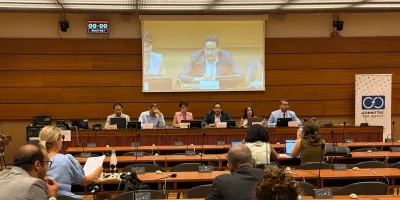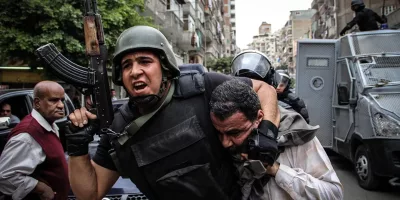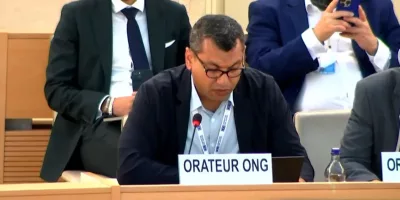News briefing
Translated and edited by: Committee for Justice
Geneva: September 29, 2022
United Nations human rights experts have expressed concern about the allegations of enforced disappearance, arbitrary detention, torture and denial of access to appropriate and timely medical care that led to the death of Ayman Muhammad Ali Omar Hodoud in Egyptian government custody, and the failure to open a proper investigation into the causes and circumstances of death in line with international standards.
Arbitrary detention, enforced disappearance and torture:
In a memorandum sent to the Egyptian authorities on July 29, 2022, the experts explained that Hadhoud was arrested from the Zamalek neighborhood in Cairo, on February 6, 2022. Two days later, a national security officer visited his family and told them that he was being held by them at the Amiriya police station, and that he would return home after completing his interrogation. On February 11, the family went to the police station to visit him, but the police station denied his presence, and they learned from private sources that he had been transferred to the Abbasiya Psychiatric Hospital.
The experts added that Hadhoud’s family went to the hospital to check on him and visit him, but the hospital administration also denied his presence. After increasing pressure, the hospital administration admitted receiving him on February 23, but prevented the family from visiting him. When the family went to the public prosecutor to obtain permission to visit him, they were informed that there was no open case under investigation against him. Then they were informed by a family friend on April 1 of his death, but they were not officially notified until April 9. They were told that he had died on March 5, but that his address was not known, according to an official version.
The experts indicated that when Hadhoud’s family received his body, they were immediately able to identify other wounds and injuries on his body, as well as some structural damage and burn marks. The family also received calls from the National Security agency to come to their offices to discuss Hadhoud’s death. The family has not so far received an official autopsy report on the body, despite the family lawyer’s repeated attempts to obtain an official report and the case file.
The Egyptian Prosecution closes the investigation:
The Egyptian Public Prosecution issued a statement on April 12, in which it said that Hadhoud was arrested on February 6, 2022, from 15 Maraachli Street in Zamalek, Cairo, while trying to storm an apartment in a building at this address. It added that he was not mentally stable during arrest and was mumbling words. Therefore, the prosecution decided that he was unfit for interrogation, and ordered his transfer to the psychiatric ward of Abbasiya Hospital, where he died of an unspecified chronic heart disease. It said that there was no criminal suspicion of his death. On June 23, the Public Prosecution issued a decision to suspend the investigation into the case, amid doubts from the family’s lawyer that the prosecution’s goal since the investigations began was clear: to exonerate the Ministry of Interior and the administration of Abbasiya Hospital.
Denial of medical care and concern over lack of proper investigation:
The experts confirmed that Hadhoud was deprived of appropriate and timely medical care, which may have caused or contributed to his death. They noted that on March 5, 2022, the nurse on duty called a doctor to report the deterioration of his health condition, so the doctor prescribed the medicine remotely without examining the patient. Although the hospital director was informed at 15:30 the same day that Hadhoud’s health condition had deteriorated, he was not transferred to a properly equipped hospital until five hours later.
The experts expressed deep concern about the detailed allegations of Hadhoud’s death while in state custody after being subjected to enforced disappearance, arbitrary detention, lack of due process, and possibly torture and other cruel, inhuman or degrading treatment or punishment, as well as the constant threat against his family by security officials.
They also expressed their alarm at the lack of prompt, effective and transparent investigations into these alleged violations in full compliance with applicable international standards, and that no person or entity has yet been held responsible for any of these violations.
UN demands from the Egyptian authorities:
The experts called on the Egyptian authorities to provide detailed information on the facts and legal bases for the arrest and detention of Hadhoud, the details of the charges and the judicial procedures initiated against him, the reason for his incommunicado detention throughout his detention, and that his family was not notified of his death until a month later, and the conditions of detention to which he was subjected.
The experts also called on Egypt to provide information on the steps taken to investigate the enforced disappearance, identify and prosecute those responsible, and information about the steps it has taken to investigate his death in custody, and the extent to which these investigations comply with international standards.
The experts also requested the authorities in Egypt to provide information regarding the provision and type of medical health care provided to Hadhoud during the deprivation of his liberty and before his death, and information on the existing monitoring mechanisms for the situation in prisons and for the investigation of deaths in prisons.






